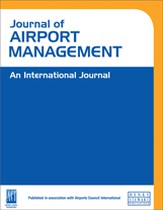Airport surface access management: Issues and policies
Abstract
Surface access is an increasingly important issue for airport managers. Currently, airport access is heavily reliant on private car trips. Rising demand for air travel in recent years has generated increased volumes of surface traffic at many airports, which has led to congestion on airport roads, overcrowded car-parking facilities, reduced local air quality and increased carbon emissions. If forecasts of future growth in world air passenger traffic are accurate, it is likely that this situation will worsen in the future. Subsequently, there has been growing pressure on airports to reduce the share of trips by private car and increase access by public transportation; however, private car trips provide an important source of revenue for airports via car-parking charges. Airport managers must formulate surface access policies that not only maximise capacity utilisation, but also marry various commercial and environmental goals. But this task is far from straightforward and there remain a number of key issues that airport managers must account for relating to the nature of surface access traffic, the varying requirements and characteristics of airport users, environmental concerns, car parking and the new market conditions in which airports operate. This paper presents these issues through a synthesis of the surface access literature and discusses various policies that can be employed to manage them. By highlighting the key surface access issues and exploring policies for their effective management, this paper aims to offer important lessons for airport managers.
The full article is available to subscribers to the journal.
Author's Biography
Thomas Budd is a Lecturer in Airport Planning and Management in the Centre for Air Transport Management at Cranfield University, UK, and Course Director for the MSc in Airport Planning and Management. His research and teaching activities focus on issues of air transport environmental sustainability and resilience planning, and how disruptive technologies can be leveraged to facilitate safe, seamless and sustainable journeys. His research in this area has been widely published in leading peer-reviewed academic journals and industry textbooks, including The Journal of Transport Geography, Transportation Research: Part A and the Journal of Air Transport Management.
Stephen Ison is Professor of Transport Policy and Programme Director of the BSc in Air Transport Management and BSc Transport and Business Management Degrees in the School of Civil and Building Engineering at Loughborough University. His research activities span all aspects of aviation and airport policy and he has a particular interest in airport surface access and the economics of airline deregulation.
